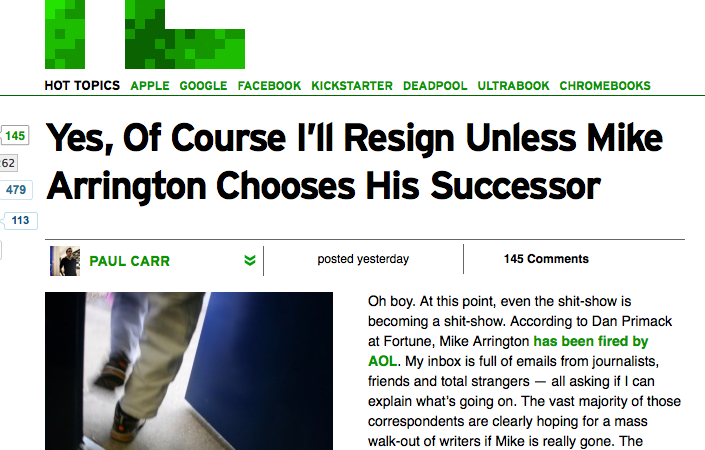Every Friday we round up media & tech industry news you may have missed.
The trouble started with the announcement that Arrington had formed a venture capital company to invest in tech start-up companies, immediately raising ethical concerns about coverage. Said David Carr:
The idea of a news site that covers every aspect of nascent tech companies sharing a brand name and founder with a venture capital firm financing these same companies seems almost comically over the line.
Oh, and AOL, which purchased TechCrunch a year ago, was investing $10 million in said fund, to which Carr remarked, “It’s now hard to know whether AOL is Mr. Arrington’s partner, client, employer or banker.”
After a series of conflicting statements from AOL execs Tim Armstrong and Arianna Huffington and belligerent blog posts from TechCrunch writers and Arrington himself in which they basically told their bosses at AOL to go to hell, the dial-up company had no choice but to get rid of him, lest it lose Huffington.
So besides the entertainment value, what does it all mean?
Mike Arrington is an asshole. So is Arianna Huffington. This was a power struggle. She won, he lost. That’s all.
Meanwhile, the TechCrunch writers are still pissed, AOL is stuck in messy severance negotiations with Armstrong, and just today, rumors began circulating that AOL is in talks to merge with also-a-hot-mess-of-a-company Yahoo. Which brings us to . . .
While Yahoo has no shortage of content and enviable web traffic, it has been unable to convert those eyeballs into dollars. The Wall Street Journal reports that the company earned an average of $6.50 per thousand pageviews in July, compared with $7.65 in July 2010.
One of the problems, according to analysts, has been ad-targeting. A former Yahoo sales rep said the company has “failed to recognize the importance of technology to target advertising to consumers.”
Alden Global Capital — which owns stakes in Gannett, McClatchy, and Tribune, among others — is the force behind the transaction that will result in a new company called Digital First Media. Ken Doctor writes about the — wait for it — newsonomics, of it all:
Does Alden Capital know something that other newspaper publishers don’t? Why is it seemingly upping its ante in an industry that has now suffered more than five years of no ad growth? I don’t think Alden’s found the formula. It does know that its properties, many bought dirt cheap, may become significantly more valuable if they can get on the other side of the digital divide, that magic time where sustainable, even small, profits are driven by digital, as the print business continues to wind down.
The clock is Alden’s — and John Paton’s — big problem. The print business is winding down even faster than they thought it would, and those transition economics are tough.
Over at Reuters, Felix Salmon contrasts the combined company with AOL’s Patch and says that with it’s existing local ad-sales talent and already-established community trust on the editorial side, Digital First Media has a far better chance of succeeding than Patch, which has neither.

